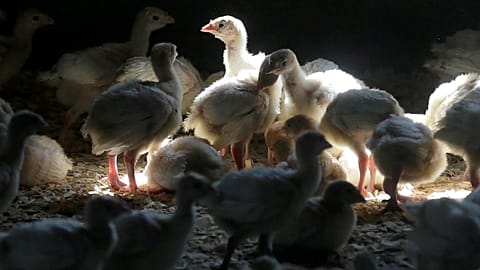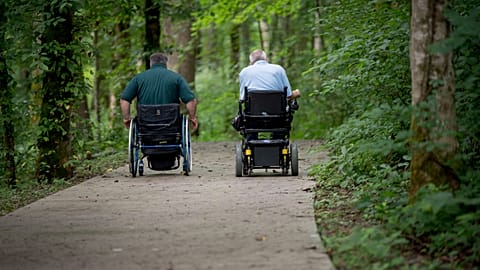Bill Gates, who already warned us about the pandemic and climate change, says bioterrorism is the next big threat we're not worrying about enough.
Bill Gates is widely known for his business acumen and humanitarian efforts. But the co-founder of Microsoft and multibillionaire philanthropist has also gained a reputation for predicting technological advancements as well as health crises and pandemics.
 ADVERTISEMENT
ADVERTISEMENT
 ADVERTISEMENT
ADVERTISEMENT
In a TED Talk in 2015, Gates warned that a pandemic was only a matter of when, not if, and that the world was not prepared to deal with it. Lately, his warnings have centred on another growing threat to global security: bioterrorism.
According to Interpol, bioterrorism refers to “the intentional release of biological agents or toxins for the purpose of harming or killing humans, animals or plants with the intent to intimidate or coerce a government or civilian population to further political or social objectives".
In a recent interview with the BBC, British journalist Amol Rajan asked Gates what was in his view the big future threat facing humanity that we were not thinking about enough.
Because we were starting "to think enough about climate change," Gates replied, the answer was "bioterror, which is really awful".
Bioterror and pandemics are sort of the same, says Gates, because they expose mankind to dangerous and even deadly diseases, but “bioterror is a little harder to defend against, because whoever’s trying to do it is [doing it] consciously and understands your defence system, so they can be trying to design around them”.
The threat of anthrax attacks
Interpol says there is sufficient information available to indicate that some individuals and terrorist groups have the capability and intent to use biological agents to cause harm to society.
The international police organisation has even developed an operational manual for investigating potential biological and chemical terrorism on the dark web, to help intelligence officers and investigators worldwide.
While a biological or toxic agent will presumably spread unexpectedly, the effective response to a biological event depends on the coordination of several actor sectors, says Interpol. “Structured prevention, preparedness and response strategies are therefore essential”.
The United States Centers for Disease Control and Prevention (CDC) says that if a bioterrorist attack were to happen, it would most likely involve the bacteria causing anthrax, a disease that can make humans and animals seriously ill.
Symptoms vary depending on how the bacteria enters the body - typically through the skin, lungs, or gastrointestinal system - which also determines the type of the disease.
Symptoms for cutaneous anthrax, the most common type, can include a group of small blisters or bumps that may itch, as well as painless skin sores with a black centre appearing more often on the face, neck, arms or hand.
All types of anthrax can “eventually spread throughout the body and cause death if they are not treated with antibiotics,” says the CDC.
Inhalation anthrax - when a person breathes in anthrax spores - “is almost always fatal. However, with aggressive treatment, about 55 per cent of patients survive”.
Anthrax has already been used in the past. In 2001, powdered anthrax was placed deliberately in letters sent through the US postal system. Twenty-two people, including 12 letter carriers, contracted anthrax, and five of these 22 people died.
Other bioweapons that could potentially be used, according to the CDC, are the variola virus (the virus that causes smallpox); a disease called glanders, which typically affects horses and has already been used in the past as a biological weapon during war; and melioidosis, an infectious disease caused by germs that occur naturally in certain parts of the world, such as Southeast Asia and northern Australia.
How to prepare for a bioterrorist attack
Assuming that after an emergency, you may need to survive on your own for several days, it is important to build a disaster supplies kit - a collection of essential items such as food, a flashlight and water.
You can find out which items should go in your kit here.
CDC also advises taking some time to discuss as a family an emergency plan. Consider questions such as: What is my shelter plan? What is my evacuation route? Do I need to update my emergency preparedness kit?
You can learn more about how to build an emergency plan and prepare for biohazards here.
Investing in health to protect against bioterrorism
Just like he did when he warned us we weren't prepared enough for a pandemic before coronavirus hit, Gates has been calling for greater investment in technologies to detect and respond to bioterror attacks.
In a 2021 interview with former UK health secretary Jeremy Hunt, Gates said he hoped to publish by 2026 a book called 'We ARE ready for the next pandemic' - and for biological attacks by extension - “but it'll take tens of billions in R&D”.
Gates, the world’s fifth richest man and the second biggest contributor to the World Health Organization, believes we must also strengthen our international cooperation and global health systems to ensure the world is better prepared against biological threats.
The good news is that every little piece of work we do to prepare for future pandemics will be “extremely useful for bioterrorism,” he told the BBC.
The bad news is that “we’re not as activated [...] as I think we should be”.

















